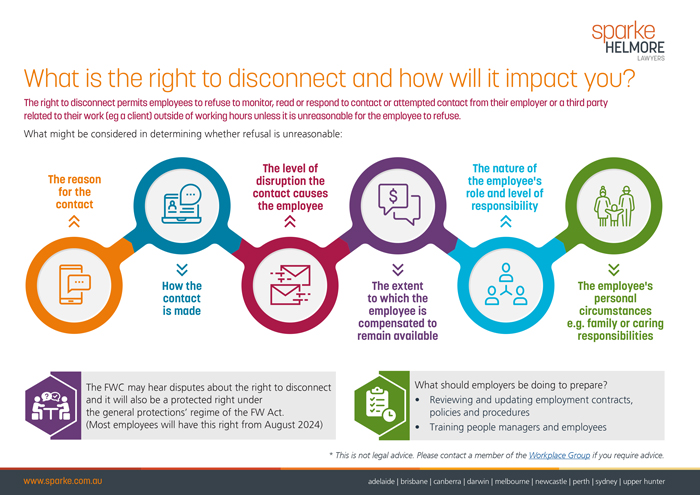What is the right to disconnect and how will it impact you?
29-April-2024The Fair Work Act 2009 (Cth) has been amended and eligible employees will have a new ‘right to disconnect’ outside of work hours.
Employees will have the right to refuse contact outside their working hours unless that refusal is unreasonable. This means an employee can refuse to monitor, read or respond to contact from an employer or a third party.
Why was there a need for the change?
There has been a blurring of lines between home and work with a shift to hybrid work/work from home post pandemic and seamless advances in modern technology. These new laws aim to provide a clearer delineation between home and work and protect employees private time by giving them right to disconnect from work
How will this impact me?
We have compiled some information below for you:

Disputes about the right to disconnect should first be discussed and resolution attempted at the workplace level. If that isn’t possible, employees or employers can approach the Fair Work Commission (FWC) to deal with a dispute. The FWC can make orders or deal with the dispute in other ways. Both employers and employees can seek orders from the FWC:
- Employees can seek an order that their employer stop making unreasonable contact with them (and be prevented from taking disciplinary action against them for their reasonable refusal).
- Employers can seek an order that an employee stop continuing to unreasonably refuse to monitor, read or respond to contact or attempted contact from their employer or a third party.
Breaching an order made by the FWC may attract civil penalties
The right to disconnect will also be a workplace right under general protection laws. These laws are protected rights all employees receive under the Fair Work Act.
When will these changes come into effect?
For business with 15 or more employees, this right will come into effect on 26 August 2024. For businesses with less than 15 employees, this right will come into effect from 26 August 2025.



